
Visual storytelling is a powerful medium that combines art and technology to convey stories, emotions, and ideas. Two of the most prominent disciplines in this field are cinematography and videography. Though often used interchangeably, they have distinct roles and purposes. This article will demystify the key differences between cinematography and videography, offering insights for beginners and helping you decide which path to pursue, whether through cinematography classes or self-study.
| Introduction |
|---|
| TCinematography: The Art of Motion Picture Photography |
| Cinematography Institute: Where to Learn the Craft |
| Videography: Capturing Real-Life Events |
| Cinematography vs. Videography: Core Differences |
| Choosing Your Path: Cinematography Classes vs. Practical Experience |
| Real-World Applications: When to Use Cinematography vs. Videography |
| The Future of Visual Storytelling: Blurring the Lines |
| FAQs |
| Conclusion |
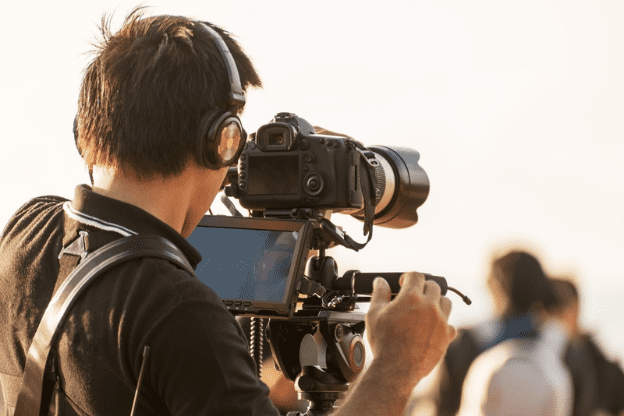
Cinematography is often associated with the film industry and encompasses the art and science of capturing moving images on film or digital media. It involves a deep understanding of visual storytelling, composition, lighting, and camera techniques. A cinematographer, also known as a Director of Photography (DP), collaborates closely with the director to bring the vision of the script to life.
Cinematographers are responsible for making artistic and technical decisions related to the visual elements of a film. They choose camera angles, lenses, lighting setups, and shot compositions to enhance the narrative. This requires a solid grasp of visual language and an ability to translate a director's vision into compelling imagery.
• Composition: Understanding how to arrange elements within a frame to create visually pleasing and meaningful shots.
• Lighting: Mastery of lighting techniques to set the mood, tone, and atmosphere of a scene.
• Camera Techniques: Proficiency in using different types of cameras, lenses, and accessories to achieve the desired visual effects.
• Collaboration: Working closely with directors, production designers, and other crew members to ensure
For those serious about pursuing a career in cinematography, enrolling in a cinematography institute can provide a structured and comprehensive education. Institutes like the RSFI Institute offer specialized cinematography classes that cover everything from the basics to advanced techniques, preparing students for a professional career in the industry.
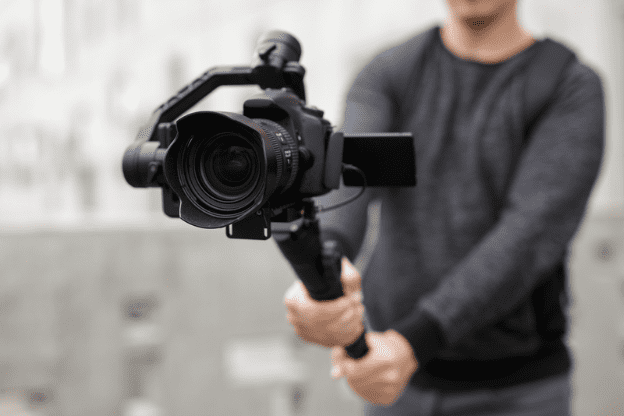
Videography, on the other hand, typically refers to the process of capturing live events or small-scale productions using video cameras. Videographers often work on projects like weddings, corporate events, documentaries, and online content. Unlike cinematography, which is more focused on artistic expression, videography emphasizes practicality and efficiency.
Videographers are often one-person operations, responsible for recording, editing, and sometimes even producing the final video. They need to be versatile and capable of handling multiple aspects of production, from shooting to post-production.
• Technical Proficiency: Skilled in operating video cameras, microphones, and other recording equipment.
• Editing: Ability to edit footage to create a coherent and engaging final product.
• Adaptability: Quick to adjust to changing conditions and capture the best possible footage in real-time.
• Client Interaction: Working directly with clients to understand their vision and deliver a product that meets their expectations.
Read About: The Basics of Camera Settings: Aperture, Shutter Speed, ISO
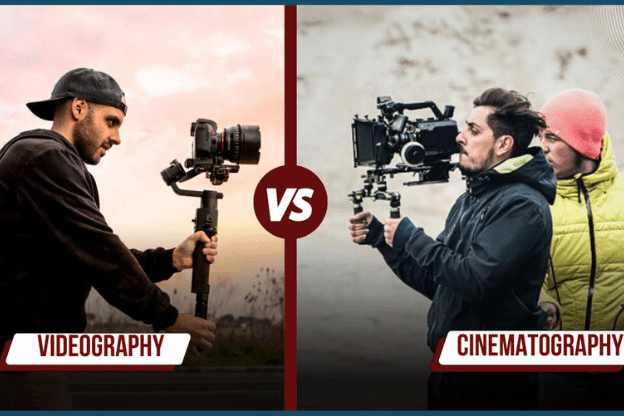
While both cinematography and videography involve capturing moving images, they differ significantly in terms of purpose, approach, and execution.
Cinematography is deeply rooted in artistic vision and storytelling. Cinematographers work to create visually stunning and emotionally impactful scenes that support the narrative of a film. Videography, however, is more focused on capturing events as they happen, often with a documentary or real-time approach.
Cinematography is typically associated with larger productions that involve extensive planning, storyboarding, and collaboration with a large crew. Videography, in contrast, often involves smaller teams or even solo operations, with less emphasis on pre-production planning.

Cinematographers use high-end cameras, lenses, and lighting equipment to achieve their desired look. They often have the luxury of multiple takes and controlled environments. Videographers, however, need to be adaptable and ready to capture footage in varying conditions, often using more portable and versatile equipment.
While both fields require a solid foundation in visual storytelling, the training paths can differ. Cinematographers often benefit from formal education at a cinematography institute, where they can learn advanced techniques and theories. Videographers, on the other hand, might gain more from hands-on experience and practical workshops.
Read About: - Best Filmmaking Courses After 12th: RSFI Institute Fees & Eligibility 2024

Deciding between a career in cinematography or videography depends largely on your interests and career goals. If you are passionate about film and visual storytelling, enrolling in a cinematography institute like RSFI Institute can provide you with the skills and knowledge needed to succeed. These programs offer in-depth cinematography classes that cover everything from lighting and composition to advanced camera techniques.
For those more interested in capturing real-life events and working on diverse projects, starting as a videographer might be a better fit. Practical experience, coupled with workshops and online tutorials, can help you build a versatile skill set.
Understanding when to apply cinematography versus videography techniques is crucial for delivering the best possible outcome for your project.
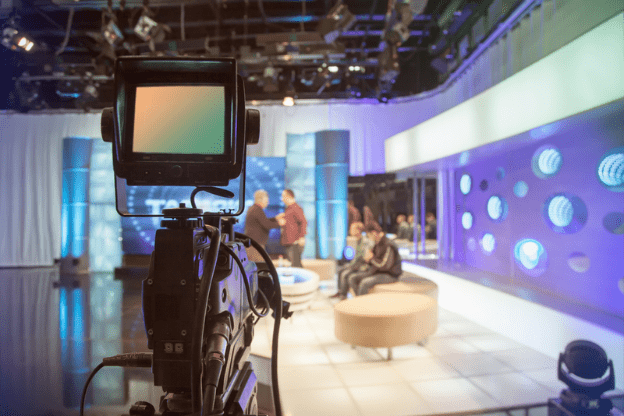
Cinematography is the go-to choice for film and television productions. The artistic and technical expertise of a cinematographer ensures that each scene contributes to the overall narrative, creating a cohesive and visually compelling story.
For corporate and commercial videos, videography is often more appropriate. These projects typically require quick turnaround times and the ability to capture events or product demonstrations efficiently. Videographers excel in creating polished and professional content that meets the client's needs.
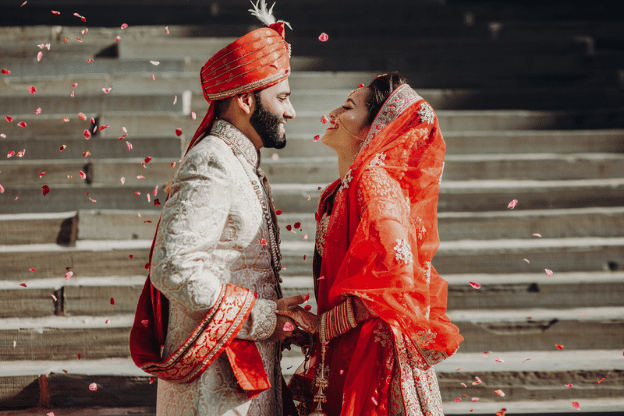
Videography is ideal for weddings and live events, where capturing real-time moments is essential. The adaptability and technical proficiency of a videographer ensure that all the important moments are recorded seamlessly, providing clients with a lasting memory of their special day.
Videography is ideal for weddings and live events, where capturing real-time moments is essential. The adaptability and technical proficiency of a videographer ensure that all the important moments are recorded seamlessly, providing clients with a lasting memory of their special day.
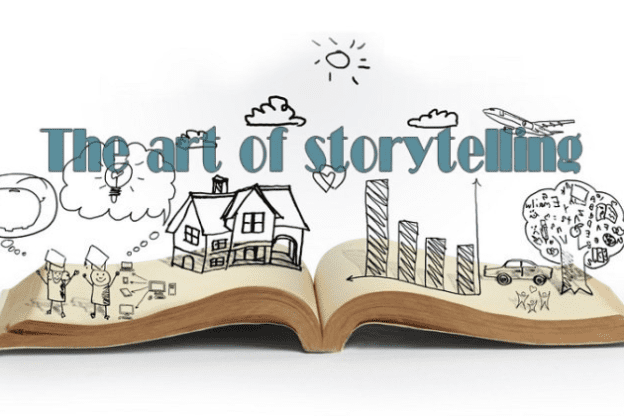
As technology advances, the lines between cinematography and videography continue to blur. Modern video cameras and editing software allow videographers to achieve cinematic-quality results, while cinematographers increasingly incorporate practical and real-time techniques into their work.
Many professionals now find themselves working in hybrid roles, where they need to draw on skills from both cinematography and videography. For instance, a filmmaker might use videography techniques to capture behind-the-scenes footage while employing cinematographic principles for the main production.

Innovations in camera technology, such as 4K resolution and high dynamic range (HDR), have made high-quality visual storytelling more accessible. Drones, gimbals, and other stabilizing equipment allow both cinematographers and videographers to capture smooth, dynamic shots that were once impossible or prohibitively expensive.
Cinematography focuses on the artistic and technical aspects of filmmaking, involving detailed planning, composition, and lighting to tell a story. Videography is more about capturing live events or small-scale productions efficiently and effectively, often with a documentary approach.
While not mandatory, attending a cinematography institute like RSFI Institute can provide structured education and hands-on experience, helping you develop the necessary skills and knowledge to succeed in the field.
Yes, videographers can work in the film industry, especially in roles such as behind-the-scenes footage, documentary segments, or promotional content. However, transitioning to a cinematographer role may require additional training and experience.
Beginner cinematographers should invest in a good quality camera, lenses, and lighting equipment. Enrolling in cinematography classes can also provide access to industry-standard gear and instruction on how to use it effectively.
Yes, many professionals start in videography and transition to cinematography as they gain experience and develop their skills. Continuing education through cinematography classes or workshops can facilitate this transition.
Enrolling in a cinematography institute offers structured learning, access to professional equipment, networking opportunities, and mentorship from experienced instructors. Institutes like RSFI Institute provide comprehensive training that prepares students for a career in the film industry.
Understanding the differences between cinematography and videography is essential for anyone interested in visual storytelling. Whether you're drawn to the artistic and technical challenges of cinematography or the practical and versatile nature of videography, both fields offer rewarding career paths. Enrolling in a cinematography institute like RSFI Institute or gaining practical experience through videography can set you on the right track. With the right skills and dedication, you can excel in either discipline or contribute to the dynamic world of visual storytelling.